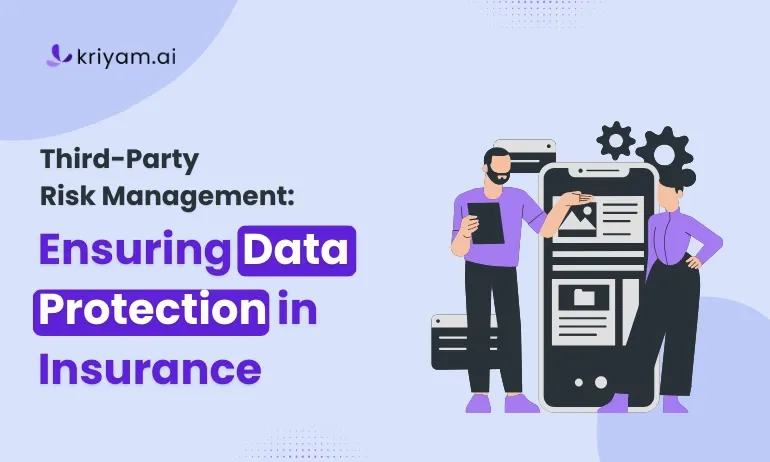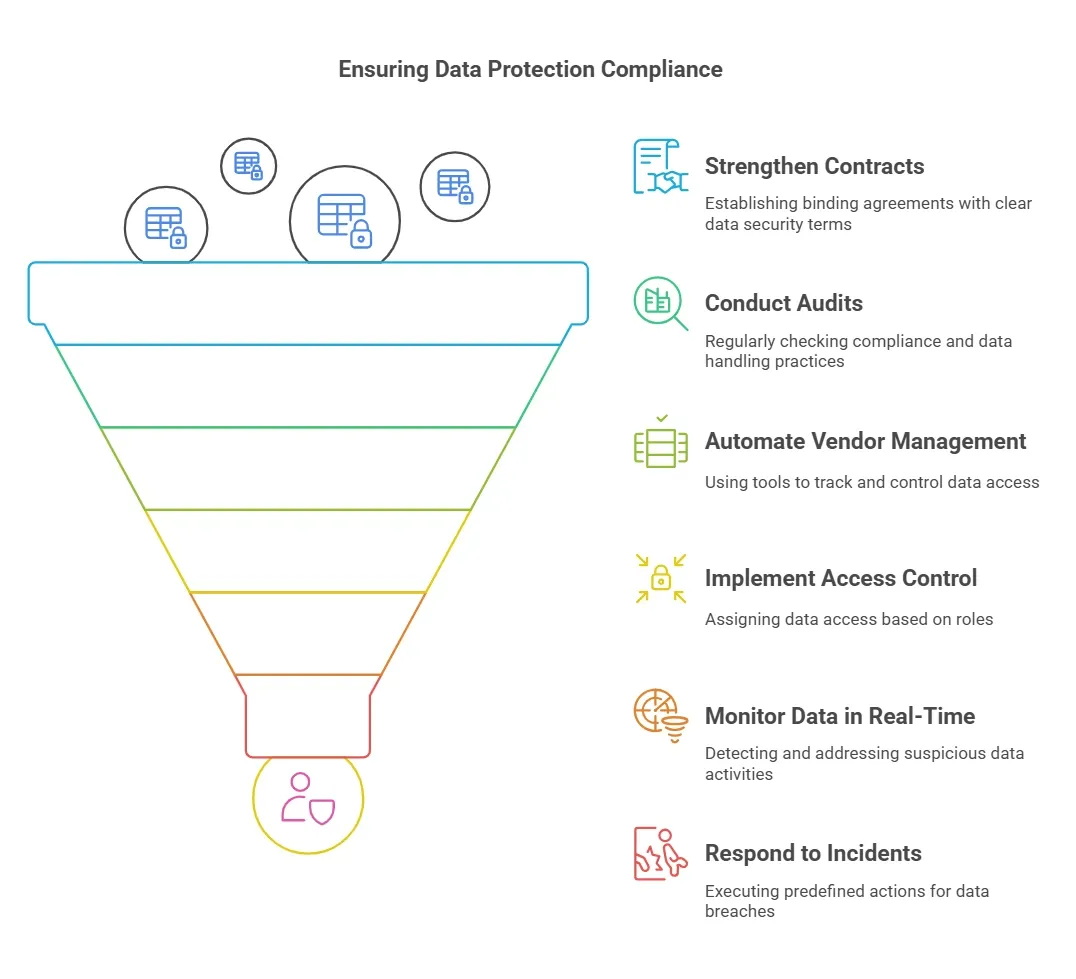Insurance

Third-Party Risk Management: Ensuring Data Protection in Insurance
In many different aspects, such as claims handling, fraud detection, field investigations, and more, insurance companies hire third-party vendors. Such vendors also handle sensitive information of customers, which requires implementing strict control measures in order to comply with data protection laws and safeguard against security breaches in India. Hence, effective third-party risk management becomes critical for compliance by the insurance industry with the Digital Personal Data Protection Act, 2023.
To achieve compliance with data privacy standards, the Digital Personal Data Protection Act 2023 imposes stringent obligations on insurance companies in regard to sharing data with third-party vendors. In the absence of some sort of necessity for supervision, access to unauthorized data, breaches of data, and the abuse of customer data can result in financial and legal ramifications of serious severity. Proper third-party risk management ensures that insurers manage these risks, increasing trust and regulatory compliance.
Why Is Third-Party Risk Management Important for Data Protection?
The insurance sector recognizes customer information to be particularly sensitive because it consists of personal and financial information. When handed over to third parties, this information must be regarded with the same security and caution as that in the insurance company. Third-party vendor compliance is intended to shield policyholder information against any unauthorized access or breaches.
Approval of the third-party vendors is essential in safeguarding the policyholder information against any unauthorized access or breaches; any failure of vendors to comply with the Data Protection Laws in India can open an avenue for levying penalties upon the insurance company. Also, a vendor may hold data on an external server or in a jurisdiction different from where the insurance company operates, which puts in place unmanageable control over security measures. Management of third-party vendors effectively ensures adherence to strict and limited contractual requirements and thus prevents risks concerning data misappropriation and privacy breaches.
Challenges in Third-Party Data Processing for Insurance
Insurance companies encounter quite a few challenges when managing data processed by third-party vendors, such as:
Unauthorized Data Access: Vendors engaged in claims verification, fraud detection, and underwriting require access to sensitive customer data. Without strong oversight, unauthorized personnel may have access to customer data, enhancing the risk of breaches.
Data Leaks and Misuse: A lot of third-party vendors store large amounts of policyholder data. Such information may attract undesirable attention from cybercriminals. Insufficient security measures would result in data leaks, giving rise to financial fraud and potential penalties.
Assuring Compliance of the Third-Party Vendors: Vendors may operate under several legal frameworks, making it challenging in India to enforce Data Protection Laws, etc., on the part of insurance companies. It is imperative for insurance companies to make sure that all vendors have complied with the Data Protection Act 2023, irrespective of where they are located.
Monitor and Control Data Access: Large insurance companies work with a number of vendors, making it cumbersome to keep track of who is accessing sensitive data and how it is being used. In the absence of a centralized framework, managing vendor compliance seems overwhelming.
No Standardized Security Practices: There are cases where some vendors work differently, employing different practices of protection of data. Therefore, it is the responsibility of the insurance company to assign similar security standards so that the risk would be reduced.
Risk of Regulatory Non-Compliance Fines: If a vendor does not meet the requirements set out by the law, insurance companies will be accountable and suffer legal and financial penalties. It is thus very mandatory that the vendor compliance be attended to since otherwise, it will lead to loss of reputation and incur fines.
How Can Insurance Companies Ensure Compliance with the Data Protection Act?

Insurance companies must use the following core measures to comply with the Digital Personal Data Protection Act 2023:
Strengthening data-sharing contracts: Insurance companies must enter binding legal contracts with service providers, listing data security procedures, how data is processed, and the level of adherence to associated regulations. These contracts must distinctly clarify how data is organized in order to avoid misuse.
Performing regular audits: Routine security and general compliance audits help insurers determine if their contractors are complying with data protection regulations. Such audits cover aspects related to how data is handled, how it is stored, and what measures and methods for controlling who has access to it exist.
Utilizing automated vendor management solutions: The automation tools enable you to track access to data to monitor what a service provider is doing with it and restrict unauthorized access to data. The system would ensure adequate real-time oversight of vendor activity with respect to sensitive information.
Implementing role-based access control: By assigning access rights based on roles, insurance companies can ensure that vendors only access data for carrying out their jobs, minimizing exposure to sensitive information.
Real-time data monitoring: New ultra-modern tracking methods can root out and flag any suspicious data access attempts and indeed stop a data breach in its tracks.
Strong incident response mechanism: Predefined responses allow the proper activities to take place in reaction to a data breach, alleviating the possible risks that vendor mismanagement poses to data.
Automation in Third-Party Risk Management & Vendor Compliance
Automation is vital within the insurance industry to help ensure that third-party vendors comply with the data protection laws in India. Such a huge volume of policyholder data being processed calls for automated solutions to boost data protection, mitigate risks, and enhance operational efficiency.
Automated Access Controls: Ensure vendors may only actually reach policyholder data pertinent to whichever function they are performing, thus minimizing unauthorized usage.
Real-Time Monitoring for Vendors: Vendor activities are continuously monitored so that any anomalies, unauthorized access attempts, or data misuse can be immediately identified.
Automated Consent Management: The complete process of collecting, verifying, and storing policyholder consent prior to sharing data with a vendor is automated to eliminate the potential for manual errors, to record correctly, and to comply with the Digital Personal Data Protection Act 2023.
Audit-Ready Compliance: The system generates a detailed report of vendor activities, which makes demonstrating compliance with data protection regulations to auditors much simpler for insurers.
From efficient field investigation workflows to vendor management automations, Kriyam's solutions provide bespoke services to the insurance industry, helping address many third-party risk management complexities. Kriyam’s Mobile App for Field Executives allows secure collection, transmission, and storage of all data collected during the claims processing or fraud investigation and customer verification, reducing the risk of any unauthorized access.
Meanwhile, the Centralized Platform for Investigation Management affords insurers a consolidated system to monitor vendor activities and encourage compliance across multiple companies with regard to access. This centralized system really provides insurance providers the ability to enhance security surrounding their vendor activities, comply with data protection provisions from the vendors, and streamline their own compliance with data protection laws.
Final Thoughts
With the implementation of the Digital Personal Data Protection Act 2023, third-party compliance and vendor risk management have never been more important for insurance companies. These vendors handling policyholder data are held to a precarious privacy and security framework to avoid breaches, fraud, and heavy fines from the regulating authority.
With the use of tools for automation for insurance processes & third-party vendor management like Kriyam.ai, regular audits, and policies allowing for strict compliance, insurers will be cutting down on the evolving factors that keep violating the data privacy regulations. Proactive risk management will ensure that customer data is secured, trust is retained, and regulations of the insurance industry are followed through.
People Also Ask
What is third-party vendor management in insurance?
Vendor management in insurance involves overseeing third-party providers to ensure they meet contract terms, deliver quality services, and align with performance and compliance goals. It plays a key role in claims support, managing services like repairs and legal assistance, while improving efficiency, reducing risks, and enhancing customer satisfaction.
How does the Digital Personal Data Protection Act 2023 impact third-party vendor compliance?
The Digital Personal Data Protection Act 2023 mandates strict regulations on data sharing, consent management, and security, requiring insurance companies to ensure that vendors comply with data protection laws.
What are the risks of third-party data processing in insurance?
Risks include unauthorized access, data leaks, and regulatory non-compliance, leading to financial and reputational damage for insurance companies.
How can insurance companies ensure vendor compliance with data protection laws?
Insurance companies can ensure third-party vendor compliance by implementing data-sharing agreements, conducting audits, and using automated vendor management solutions to monitor security measures.
How does automation improve third-party risk management?
Automation enhances third-party or vendor risk management by enforcing data access controls, tracking vendor activities in real time, and streamlining compliance efforts to ensure data protection in insurance.
Kriyam.ai Content Team
7th March, 2025
Latest
LATEST BLOGS
Automation
Top 5 Best Field Service Management Software in 2025
Best Field Service Management Software
Shreyas R
27th November, 2023
FEATURED
Automation
Top 5 Best Field Service Management Software in 2025
Best Field Service Management Software
Shreyas R
27th November, 2023





